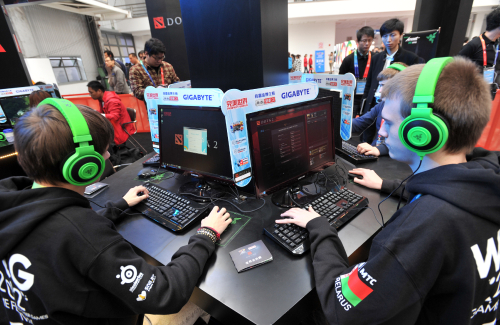|
 |
|
CYBER COMPETITION: E-athletes at the final of the 2012 World Cyber Games held in Suzhou, Jiangsu Province, on November 29, 2012 (CFP) |
Like Wu and Yang, Zhang also has an online shop, which brings her more income to supplement that from her commentary.
"E-sports is very different today from how it was in 2005," said Zhang. "The clubs have now started to package the players, get them dressed up and improve their public image. E-sports players don't have to hide in small shabby Internet cafes any more. It is not a small venture anymore. A top player will have a lot of fans."
The time is now
Zhou Yi, who also graduated from Beijing Normal University, is now the executive chief editor of E-Sports, the first e-sports magazine in China.
Unlike other magazine editors who sit in the office making arrangements, Zhou goes out all the time, carrying his camera and conducting interviews. Zhou said he does this out of his passion for e-sports.
"Many people still have something against e-sports," said Zhou. "Even mainstream media, when reporting on e-sports, also tend to refer to it as just computer games or a career for ill-educated people. It is understandable if they made this judgment 10 years ago, but if they still think in this way now, it is unfair and even ignorant."
But Zhou also admitted that most e-sport players, since they are very young, have to be looked after psychologically. "They might give up easily and find it hard to cope," said Zhou.
For Zhou, many journalists reporting on e-sports would focus on the contradiction between players and their parents or girlfriends. It is rare to see a report on the e-sports as a serious profession.
"People involved in the industry need to shoulder some of these responsibilities," said Zhou.
When discussing the violent nature of some of the themes in the games used for e-sports, Zhou quoted one father he interviewed in the past: "Compared to the violence in some TV series and movies, it is not too bad."
Xinhua News Agency reported recently that Chongqing Energy College has started offering an optional course on the popular computer game DOTA and the course is named "Recent development of electronic sports and analysis of DOTA teams." The course was an understandable hit, with students scrambling to get a place on the course.
The course's teacher Zeng Qingqing stressed that the content of his class centers on analyzing teamwork strategies, rather than teaching students how to play online games.
"Electronic sport courses can cultivate a way of thinking, a sense of perseverance and teamwork, which are necessary for entering into society," said Zeng. "Students should view it like other sports courses such as basketball, football and chess."
In 2011, Zhejiang Sci-Tech University also opened an optional course on e-sports. Zhou Weida, the coordinator, said the course's purpose was to help students relax from the heavy burden of academia. Ninety-five percent of the students in the class are males.
For Pei Le, Chairman of ACE, these classes are a good sign that e-sports are making progress in being more accepted by society. As an e-sports player for more than 10 years, Pei said he feels e-sports are gaining much more popularity compared to the late 1990s when he formed his own e-sports team.
"I hope that with the collective efforts of everyone involved, these sports can recognized by society," said Pei. "I believe it will happen."
| 